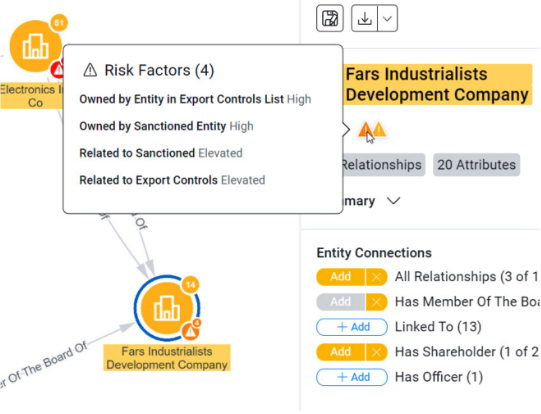2022 was marked by a seemingly nonstop wave of Russian sanctions. While governing bodies have slowed on issuing new sanctions, they haven’t slowed on enforcement of existing measures.
In a first-of-its-kind tri-seal compliance note, the Department of Commerce, Department of the Treasury, and Department of Justice have issued a joint notice to alert the international community, the private sector, and the public of attempts to evade sanctions and export controls in support of Russia’s military-industrial complex and war against Ukraine.
>> Learn how to navigate Russian sanctions and prepare for new threats <<
What does the compliance note highlight?
The tri-seal compliance note warns companies on how Russia uses third-party intermediaries and transshipment points to circumvent restrictions and obscure the true identities of Russian end users.
It additionally lists common red flags that indicate that a third-party intermediary may be engaged in efforts to evade sanctions or export controls, including:
- Use of corporate vehicles (i.e., legal entities, such as shell companies, and legal arrangements) to obscure (i) ownership, (ii) source of funds, or (iii) countries involved, particularly sanctioned jurisdictions;
- A customer’s reluctance to share information about the end use of a product, including reluctance to complete an end-user form;
- Use of shell companies to conduct international wire transfers, often involving financial institutions in jurisdictions distinct from company registration;
- Declining customary installation, training, or maintenance of the purchased item(s); IP addresses that do not correspond to a customer’s reported location data;
- Last-minute changes to shipping instructions that appear contrary to customer history or business practices;
- Payment coming from a third-party country or business not listed on the End-User Statement3 or other applicable end-user form;
- Use of personal email accounts instead of company email addresses;
- Operation of complex and/or international businesses using residential addresses or addresses common to multiple closely-held corporate entities;
- Changes to standard letters of engagement that obscure the ultimate customer;
- Transactions involving a change in shipments or payments that were previously scheduled for Russia or Belarus;
- Transactions involving entities with little or no web presence; or
- Routing purchases through certain transshipment points commonly used to illegally redirect restricted items to Russia or Belarus. Such locations may include China (including Hong Kong and Macau) and jurisdictions close to Russia, including Armenia, Turkey, and Uzbekistan.
How can companies avoid sanctions evasion attempts?
With Russia using third-party intermediaries to evade sanctions, the need for third-party risk management has never been higher. Corporate enterprises need to have comprehensive insight into international trade networks.
Sayari’s commercial risk intelligence allows investigative teams to thoroughly and efficiently perform due diligence on suppliers, vendors, distributors, customers, and other third parties. Precomputed risk indicators and a suite of graph analytics tools empower compliance teams to quickly and confidently conduct due diligence on global third parties to uncover any ties to Russia.

- Get “single-click” beneficial ownership mapping and distance calculations between your targets and watchlisted entities
- Mitigate reputational risk with comprehensive adverse media from across 120 jurisdictions
- Tailor searches to your exact requirements with filters based on risk type, jurisdiction, and distance-to-risk
To learn more best practices for proactively mitigating sanctions exposure, watch our webinar covering HSBC’s Russian sanctions analysis investigations.